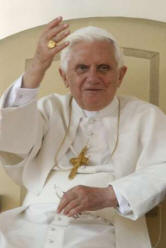|
Pope Benedict XVI- Angelus |
 Angelus
Angelus
On the Suffering the Lord Allows
God "is Good and Cannot Will Evil"
H.H. Benedict XVI
March 7, 2010
www.zenit.org
Dear brothers and sisters,
The liturgy of this Third Sunday of Lent presents us with the theme of
conversion. In the first reading, taken from the Book of Exodus, Moses,
while he is feeding his flock, sees a burning bush, which is not
consumed by the fire that burns it. He comes closer to observe this
prodigy when a voice calls him by name and, inviting him to be aware of
his unworthiness, commands him to take off his shoes, because the place
is a holy one. [The voice says to him] “I am the God of your father, the
God of Abraham, the God of Isaac, the God of Jacob”; and adds: “I am he
who is!” (Exodus 3:6a, 14).
God manifests himself in different ways also in each of our lives. To
recognize his presence however we must draw near to him aware of our
misery and with profound respect. In any other way we would make
ourselves incapable of meeting him and of entering into communion with
him. As the Apostle Paul writes, this event too is told about for our
edification: It reminds us that God does not reveal himself to those who
are pervaded by sufficiency and frivolity, but to him who is poor and
humble before him.
In the passage from today’s Gospel Jesus is questioned about some
sorrowful events: the killing in the Temple of some Galileans on the
order of Pontius Pilate and the collapse of a tower on some passers-by
(cf. Luke 13:1-5). In the face of the facile conclusion that the evil is
the effect of divine punishment, Jesus restores the true image of God,
who is good and cannot will evil, and warning people not to think that
these misfortunes are the immediate effect of the personal guilt of
those who suffered them, says: “Do you think that because these
Galileans suffered in this way they were greater sinners than all other
Galileans? By no means! But I tell you, if you do not repent, you will
all perish as they did!” (Luke 13:2-3).
Jesus invites us to interpret these facts differently, connecting them
with conversion: misfortunes, sorrowful events, should not arouse
curiosity in us or a seeking of people presumed to be guilty, but they
must be occasions for reflecting, for overcoming the illusion of
pretending to live without God, and for reinforcing, with the Lord’s
help, the commitment to change our life. In the face of sin, God shows
himself to be full of mercy and he does not fail to call sinners to
avoid evil, to grow in his love and to concretely help our neighbor in
need, to live the joy of grace and not risk eternal death. But the
possibility of conversion entails that we learn to read the events of
life in the light of faith, animated by the holy fear of God. In the
presence of suffering and grief, true wisdom is to let oneself be called
from the precariousness of existence and to read human history with
God’s eyes, who, always and only wanting the good of his children, by an
inscrutable plan of his love, sometimes allows them to be tried through
suffering to lead them to a greater good.
Dear friends, let us pray to Mary Most Holy, who accompanies us on the
Lenten journey, to help every Christian to return to the Lord with his
whole heart. May she sustain our firm decision to renounce evil and to
accept God’s will in our life with faith.
[Translation by Joseph G. Trabbic]
[After the Angelus, the Pope greeted the people in several languages. In
English, he said:]
I greet all the English-speaking pilgrims and visitors present for
today’s Angelus, especially a group of visitors from Boston, in the
United States. The readings of today’s liturgy invite all of us to
embrace conversion, and to be humble in allowing the Lord to prepare us
to bear more fruit. Our cooperation with the Lord often demands great
sacrifice, but the fruit which that conversion bears always leads to
freedom and joy. May we experience these great gifts of God! Upon each
of you and your loved ones at home, I invoke God’s abundant blessings.
©Copyright 2010 - Libreria Editrice Vaticana
Look
at the One they Pierced!
This page is the work of
the Servants of the Pierced Hearts of Jesus and Mary